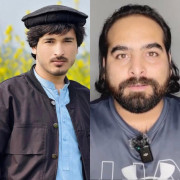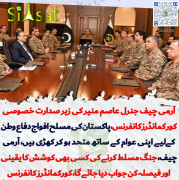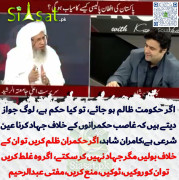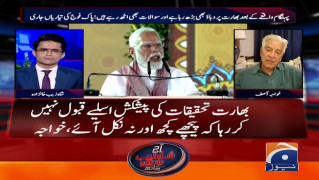modern fakir
MPA (400+ posts)
RECITATION AND SINGING WITH OR WITHOUT MUSIC
IN THE LIGHT OF QURAN AND AHADITH
___________________________________________________________________
IN THE LIGHT OF QURAN AND AHADITH
___________________________________________________________________
If someone tries to sum up the change in Arabs in the hands of Prophet Mohammad (SAWS), he will conclude that the Prophet (SAWS) cleansed their hearts and changed their mindset and made them good Muslims.
From their past traditions, what was allowed to be continued by Prophet Mohammad (SAWS)?During Prophet’s (SAWS) time, there were only two musical instruments, flute and tambourine and both these instruments were permitted.
Now a days many new musical instruments have been made. If someone uses them in singing, why can’t these be allowed?All Hadiths relating to prevention of Singing (Gina) have been proved to be ‘weak Ahadith’ by all Imams of Fiqh.
_______________________________________
At the time of the advent of Prophet Mohammad (SAWS) people who lived in Hijaz were mostly descendants of the followers of Prophet Ibrahim (AS) and Hazrat Ismail (AS).
The historians say that the period between Ibrahim (AS) and Prophet Mohammad (SAWS) was over 2000 years. During this period, people gradually deviated from the teachings of Prophet Ibrahim (AS) and though they believed in one God, they started worshiping idols of all kinds. Many of these idols were brought to Makka Al-Mukarrama from far off places where Arabs used to go for merchandise.Some Arabs were also the followers of other prophets; like Hazrat Moosa (AS) and Hazrat Isa (AS) who were known as Jews and Christians respectively. In Islamic history, this period is known as ‘the days of illiteracy (Ayyam-e-Jahiliyyah).
What changes took place after the advent of Prophet Mohammad (SAWS)?
Prophet Mohammad (SAWS) brought the Arabs back to Islam; introduced worship of Allah (SWT) and showed them how to worship Him. Certain practices of Arabs, like killing of girl child, wine drinking, usury, etc., were forbidden. Few other things were not banned, but regularized as per Islamic laws. Like unlimited polygamy was stopped and people were allowed to marry a maximum of 4 women with certain conditions. Improvement on humanistic behavior was introduced which helped them to become sincere and good human beings.
If anyone tries to sum up the change in Arabs in the hands of Prophet Mohammad (SAWS), he will conclude that the Prophet (SAWS) cleansed their hearts and changed their mindset and made them good Muslims.
From their past traditions, what was allowed to be continued by Prophet Mohammad (SAWS)?
The day to day lives of Arabs mostly remained unchanged with the exclusion of certain areas where Islamic reforms were introduced. Their living, their eating habits, their clothing, their cultural traditions, their practice of doing business, and many more things continued, rather Islamic rules further improved their living conditions.For instances they were not required to change their names. They were allowed to continue with their wives and children. They were allowed to live in their own houses and encouraged to continue their businesses/agriculture as usual, except that usury was prohibited.
There were hundreds of tribes of Arabs living in Arabian Peninsula and Prophet Mohammad (SAWS) did not force them to change anything except certain areas where Islamic reforms were introduced.
Arab tribes had different accent in their colloquial Arabic. They were allowed to recite Quran in their own accent. But these recitals did not have any bearing on the understanding of the Quran. These recitals were later known as ‘seven recitals’ and ten recitals. Prophet Mohammad (SAWS) did not force them to use the accent of Quraish in reading Quran. In all these recitals, Hazrat Hafs (RU) recital was very close to the accent of Quraish.
Singing as a show happiness was wide spread in Prophet’s (SAWS) time. Certain cultural traditional dances remained unchanged. In a nutshell, Prophet Mohammad (SAWS) did not touch the cultural life of Arabs except in certain areas where Islamic values were introduced.
Islam is a versatile and happening religion. It is meant for the people of the whole world until the day of Resurrection. The cultural values of people of the whole world can be accommodated within the parameters of Islam. Islam has taught people certain basic requirements in their lives. These have to be as per the basic laws of Islam as taught by Prophet Mohammad (SAWS). Islam does not impose anything against the basic nature of human beings. It reforms their nature and facilitates them to become good human beings.
It is in Quran – ‘O’ people of belief, do not consider forbidden those good things that Allah (SWT) has allowed. (Al-Maa’ida – 87).
It is in Hadith – It is narrated by Hazrat Abu Huraira (RU) that the Apostle (SAWS) said, ‘one who does not recite Quran with rich (vocal) recitation, is not among us. (Bukhari and Muslim).
It is in Hadith - It is narrated by Hazrat Abu Huraira (RU) that the Apostle (SAWS) said Allah (SWT) does not listen to anything the way He listens to the loud vocal recital of Quran by the melodious voice of the Prophet (SAWS). (Bukhari and Muslim).
Writing of poetry and its recitation was allowed by Prophet Mohammad (SAWS).
It is in Hadith - It is narrated by Hazrat Buraida (RU) that I heard Prophet (SAWS) saying, some (couplet) is convincing speech, some are ignorant talk, and some couplet is wisdom and some are narrow mindedness’(Abu Dawood).
Writing of Na’at (Eulogy of Prophet Mohammad –SAWS) and its recitation was very much liked by the Prophet (SAWS).
It is in Hadith - The mother of believers, Hazrata Aisha (RA) narrated that the Prophet (SAWS) used to keep a Pulpit ( stand ) at the Prophet’s (SAWS) mosque for Hazrat Hassaan Bin Saabith (RU), and Hazrat Hassaan (RU) used to climb over it and used to express pride for, and defend Prophet (SAWS) (meaning he used to recite Na’at) and the Prophet (SAWS) used to say that Allah (SWT) supports Hassaan from Hazrat Jibreel (AS) as long as he expresses pride for and defends the Apostel (SAWS). (Bukhari).
Playing of tambourine (Daf) and flute and dancing in joy was allowed and liked by Prophet Mohammad (SAWS).
It is in Hadith – Hazrata Aisha (RA) has narrated that the Apostel(SAWS) said that ‘make announcement for the marriage ceremony and perform the ceremony at mosque and play on the tambourine (Daf).(Tirmizi).
It is in Hadith –It is narrated by Hazrat Mohammad Bin Haatib (RU), and he narrates it from Prophet Mohammad (SAWS) who said that the difference between lawful (halaal) and unlawful (Haraam) is that in marriages singing and drum beating is performed. (Ahmad, Tirmizi, Nasa’ee and Ibnu Maaja).
It is in Hadith – Hazrata Aisha (RA) narrates that when one Ansari’s bride was sent to her groom’s house in her bridal attire, the Prophet (SAWS) said that ‘Don’t you have some play and fun because the Ansar’s like fun’. (Bukhari).
It is in Hadith – It is narrated by Hazrata Aisha (RA), she said ‘I swear to Allah (SWT), I saw the Prophet (SAWS), and the Habashis (a tribe of Madina) are playing (dancing) with spears and the Prophet (SAWS) hides me with his coverlet so that I could see their play from between his ear and shoulder. Then he stays for me until I myself will return back’. (Bukhari and Muslim).
It is in Hadith –It is narrated by Hazrat Abu Moosa (RU) that the Prophet (SAWS) said, O’Moosa, you have been given a flute of the people of Dawood (AS). (Tirmizi).
It is in Hadith – Hazrata Aisha (RA) narrates that Hazrat Abu Bakr (RU) came to our home when two girls were clapping and playing on the tambourine (Daf) during ‘Mana’, and in another narration (the girls were) singing such couplets which were recited by Ansaars during the war of Ba’as. When Hazrat Abu Bakr (RU) chided these girls, the Prophet (SAWS) took out the (bed) sheet from his face and said O’Abu Bakr (RU), leave them, as this is festival time. And in one narration (it is said) O’ Abu Bakr (RU), every nation has festival and this is our festival.’(Bukhari and Muslim).
During Prophet’s (SAWS) time, there were only two musical instruments, flute and tambourine and both these instruments were permitted.
Now a days many new musical instruments have been made. If someone uses them in singing, why can’t these be allowed?
However, if someone is singing something which explains physical beauty of a woman or describes polytheism and infidelity or idolatery, its recital and singing is senseless, waste of time and will be considered as sin.
Similarly, singing and dancing of young men and women together on stages cannot be allowed.
Every aspect of human activity has positive and negative features. Islam disallowed negative features and allowed the positive side.
Fornication and infidelity is not allowed. But you can have legal marital bliss.Singing, music and dancing which leads people towards sin cannot be allowed. But if someone recites the eulogy of Prophet Mohammad (SAWS), meaning recites Na'at, with musical instruments, how can it be disallowed?
If someone sings in praise of his parents because they have supported him in his life, how can we disallow it?
If someone sings in praise of his teacher for his services, how can it be disallowed?
If someone recites a poetry in praise of his Shaikh who taught him Arabic, Quran and Hadith, how can this be disallowed?
If someone sings, dances and plays musical instruments in times of joys, festivals, marriages, how can it be disallowed?
If someone arranges ‘Sama’ gatherings and recital of poetry in praise of Prophet Mohammad (SAWS) and As-hab-e-Rasulullah (SAWS) and legendary Shaikhs of Ihsan and uses musical instruments, this will be treated as Sunnah because Prophet Mohammad (SAWS) has allowed and liked it.
Muhammad ibn Ahmad al-Saffarini al-Hanbali (d. 1188) relates in his Ghidha' al-albab li-sharh manzumat al-adab from Ibrahim ibn `Abd Allah al-Qalanasi that Imam Ahmad said about the Sufis: "I don't know people better than them." Someone said to him: "They listen to music and they reach states of ecstasy (Meaning they do Wajd)." He said: "Do you prevent them from enjoying an hour with Allah (SWT)?"
If people recite Salam and Durood in chorus with music on Prophet Mohammad (SAWS) it will be treated as Sunnah because Prophet Mohammad (SAWS) and Allah (SWT) both like it.
The tradition of hearing of vocal music is also proved from companions of Prophet Mohammad (SAWS) and their first and second generation followers. Read the following 15 Ahadith.
- It is narrated by Ibne Abdul Bar that Hazrat Omer (RU) heard vocal music.
- It is narrated by Madarvi and Rafa’ee that Hazrat Osman (RU) heard vocal music.
- It is narrated by Ibn Abi Shaibah that Hazrat Abdul Rahman Bin Auf (RU) heard vocal music.
- It is narrated by Baihaqi, Ibn Maaja, Sa’eed Bin Mansour and Wahidi that Hazrat Abu Obaidah bin Jarrah (RU) heard music.
- It is narrated by Baihaqi that Hazrat Bilal (RU), Hazrat Abd bin Arqam (RU) and Hazrat Osama Bin Zaid (RU) heard it.
- It is narrated by Ibn Zaher that Hazrat Hamza (RU) heard it.
- It is narrated by Abu Nayeem that Hazrat Barra bin Malik heard it.
- It is narrated by Ibn Abdul Bar that Hazrat Abdullah Bin Jaber (RU) heard it.
- It is narrated by Abu Talib Makki that Hazrat Abdullah Bin Zubair (RU) heart it.
- It is narrated by Abu Tafra Asbahani that Hazrat Hassaan Bin Saabith (RU) heard it.
- It is narrated by Zubain bin Akkar that Hazrat Abdullah bin Omer (RU) heard it.
- It is narrated by Ibn Qutbla that Hazrat Hazrat Qurazta bin Ka’ab heard it.
- It is narrated by Bukhari that Hazrata Aisha (RA) heard it.
- It is narrated by Abu Talib Makki that Hazrat Mugaira bin Sha’aba (RU) heard it.
- It is narrated by Madravi that Hazrat Umroo bin Aass (RU) heard it.
The listeners of Audition (singing/recital with music) are numerous in Prophet’s (SAWS) time and later among his companions and their second generation ta’aba’een (known as Salaf).
All 4 Imams of Fiqh and Ibn Ainia and Sha’afais have supported this school of thought.
All Hadiths relating to prevention of Singing (Gina) have been proved to be ‘weak hadiths’ by all Imams of fiqh.
Some misguided people and their like minded groups always mention a Hadith in which it is mentioned that ‘wine, fornication, silky wear and singing are not allowed’.
It is obvious, the singing will be judged as per the assembly of people and what they are singing. But, how can someone imposes this Hadith on the recitation of Na’at of the Prophet (SAWS) which was liked by him very much?
Click Here for further reading on the subject
If anyone denies authentic Prophet's (SAWS) Ahadith, he will go out of Islam as an arrow goes out of the bow.If someone accepts the claim of some misguided sects., we will be in great trouble on the Day of Judgment. Let us be careful about it.
Recitation of Salam, Sama, Eulogy of all venerable people of religion with or without Music is allowed in Islam, because the Prophet (SAWS) and Sahaba have allowed it.
To do Wajd, or stand or cry slowly or loudly in Sama gatherings on couplets of eulogy on Prophet Mohammad (SAWS) is Sunnah. Allah (SWT) and His Apostle (SAWS) feel happy about it. All these actions are proved by the traditions of the companions of Prophet Mohammad (SAWS) and their followers.What kind of following of Salaf is this?
The misguided people and their like minded groups say that they follow the Salaf ( the companions of Prophet Mohammad – SAWS and their first generation followers – ta’aba’een ), but in practice they do exactly the opposite of it.
It is in Quran – ‘O’people of belief, do not consider forbidden those good things that Allah (SWT) has allowed. (Al-Maa’ida – 87).
Some misguided people have the habit of imposing Quranic verses and Ahadith meant for disbelievers, on Muslims in order to misrepresent Islam on the gullible people. Innocent people get carried away by their utterances and get mislead. They do not realize that by their actions, they may get some worldly benefits or may be leadership of the community, but what will happen in Hereafter should be a matter of concern for them.
Last edited:

































